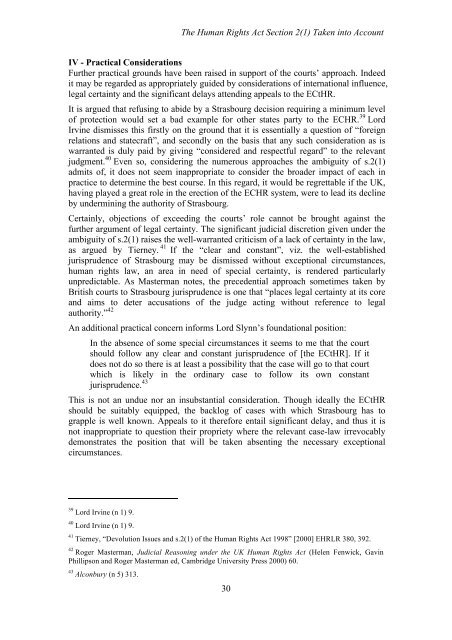Open UKLSR Volume 1(2) - Uklsa
Open UKLSR Volume 1(2) - Uklsa
Open UKLSR Volume 1(2) - Uklsa
You also want an ePaper? Increase the reach of your titles
YUMPU automatically turns print PDFs into web optimized ePapers that Google loves.
The Human Rights Act Section 2(1) Taken into Account<br />
IV - Practical Considerations<br />
Further practical grounds have been raised in support of the courts’ approach. Indeed<br />
it may be regarded as appropriately guided by considerations of international influence,<br />
legal certainty and the significant delays attending appeals to the ECtHR.<br />
It is argued that refusing to abide by a Strasbourg decision requiring a minimum level<br />
of protection would set a bad example for other states party to the ECHR. 39 Lord<br />
Irvine dismisses this firstly on the ground that it is essentially a question of “foreign<br />
relations and statecraft”, and secondly on the basis that any such consideration as is<br />
warranted is duly paid by giving “considered and respectful regard” to the relevant<br />
judgment. 40 Even so, considering the numerous approaches the ambiguity of s.2(1)<br />
admits of, it does not seem inappropriate to consider the broader impact of each in<br />
practice to determine the best course. In this regard, it would be regrettable if the UK,<br />
having played a great role in the erection of the ECHR system, were to lead its decline<br />
by undermining the authority of Strasbourg.<br />
Certainly, objections of exceeding the courts’ role cannot be brought against the<br />
further argument of legal certainty. The significant judicial discretion given under the<br />
ambiguity of s.2(1) raises the well-warranted criticism of a lack of certainty in the law,<br />
as argued by Tierney. 41 If the “clear and constant”, viz. the well-established<br />
jurisprudence of Strasbourg may be dismissed without exceptional circumstances,<br />
human rights law, an area in need of special certainty, is rendered particularly<br />
unpredictable. As Masterman notes, the precedential approach sometimes taken by<br />
British courts to Strasbourg jurisprudence is one that “places legal certainty at its core<br />
and aims to deter accusations of the judge acting without reference to legal<br />
authority.” 42<br />
An additional practical concern informs Lord Slynn’s foundational position:<br />
In the absence of some special circumstances it seems to me that the court<br />
should follow any clear and constant jurisprudence of [the ECtHR]. If it<br />
does not do so there is at least a possibility that the case will go to that court<br />
which is likely in the ordinary case to follow its own constant<br />
jurisprudence. 43<br />
This is not an undue nor an insubstantial consideration. Though ideally the ECtHR<br />
should be suitably equipped, the backlog of cases with which Strasbourg has to<br />
grapple is well known. Appeals to it therefore entail significant delay, and thus it is<br />
not inappropriate to question their propriety where the relevant case-law irrevocably<br />
demonstrates the position that will be taken absenting the necessary exceptional<br />
circumstances.<br />
39 Lord Irvine (n 1) 9.<br />
40 Lord Irvine (n 1) 9.<br />
41 Tierney, “Devolution Issues and s.2(1) of the Human Rights Act 1998” [2000] EHRLR 380, 392.<br />
42 Roger Masterman, Judicial Reasoning under the UK Human Rights Act (Helen Fenwick, Gavin<br />
Phillipson and Roger Masterman ed, Cambridge University Press 2000) 60.<br />
43 Alconbury (n 5) 313.<br />
30


